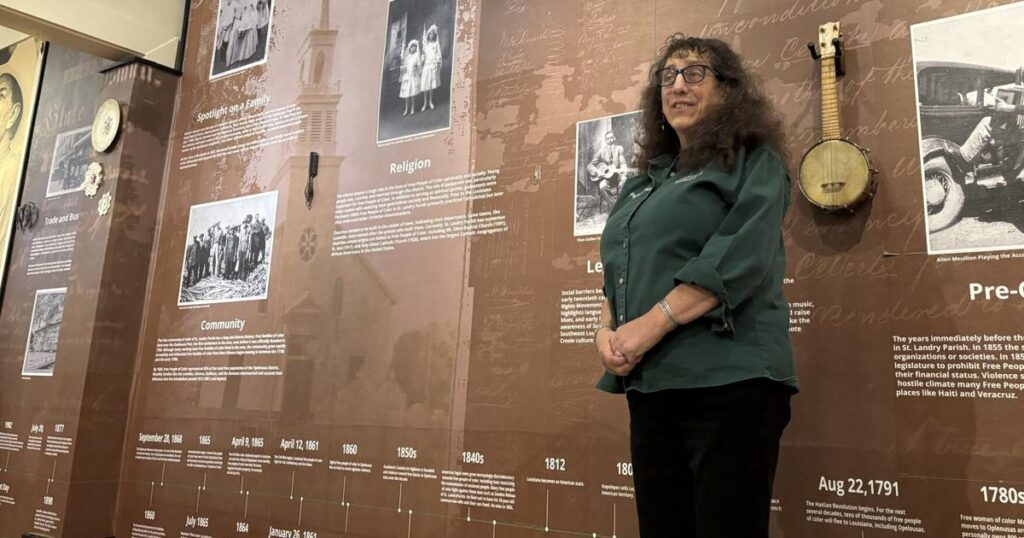Director Patrice Melnick walked among the rooms of the Opelousas Museum and Interpretive Center on Opelousas’ North Main Street. The rooms detail the history of Louisiana’s third-oldest city, behind Natchitoches and New Orleans.
A neat trivia fact, but what’s less known is that St. Landry Parish had the second largest population of Freedmen residing in it after the Civil War.
That history might have been forgotten if it hadn’t been for the work of the museum did to document it in its 2023 exhibit titled, “Still Rising: Free People of Color in St. Landry Parish.” The display tracks the history of free people of color across the parish. Some of those same families still reside in the town.
Grant funding was crucial for the project, Melnick said.
“We can keep the museum open but we couldn’t do this (without a grant) and this is the kind of project that has an important impact on the community,” Melnick said. “If someone is curious and they want to learn more about who they are, where they are, what’s possible. This is a really important resource for education and the community.”
‘Literally canceled overnight’
Funding may become scarce in the future, as President Donald Trump continues a push to dismantle the National Endowment for the Humanities and the Arts. The president’s 2026 Discretionary Budget Request seeks to completely defund and shutter the agencies, which were created in 1965.
The Louisiana Endowment for the Humanities provided $5,000 for the Opelousas Museum to create its exhibit to highlight St. Landry Parish’s free people’s cultural history. The grant allowed the museum to hire a genealogist, a designer and a graduate student to put together the display.
LEH, a nonprofit and state affiliate of the NEH, receives about $1.1 million in federal funding, said Executive Director Miranda Restovic. On April 2, the organization received an email letting them know their funding had been cut off.
“NEH has reasonable cause to terminate your grant in light of the fact that the NEH is repurposing its funding allocations in a new direction in furtherance of the President’s agenda,” the letter read.
“It didn’t give reasons and it didn’t give remedy options,” Restovic said. “Usually you would get an appeal or an opportunity to correct if there was something they found wrong.”
The case is similar to state affiliates across the country.
“This is a 50-year relationship between the Louisiana Humanities Council and a federal agency that was literally canceled overnight,” she added.
‘Local history, local projects’
Federal spending accounts for around 20% to 30% of the LEH’s annual budget. In 2024, federal grants made up 16.6% of the organization’s budget, with 46% coming from state grants and the rest coming from private donors, grants, and earned revenue, according to LEH’s annual report. Of that funding, 84% went to programming, with 10% going toward administrative costs.
LEH grants support projects all over the state, not just the urban cores, Restovic said. In addition to the Opelousas museum, the organization has worked with groups in Vermilion, St. Martin, Rapides and Iberia parishes in the Acadiana region.
“A lot of these projects are typically focused on local history, local projects, and local people who are involved,” Restovic said.
LEH has also provided grants for cultural events such as Festivals Acadiens et Creoles and the Southern Screen Festival in Lafayette.
But while urban partners might be able to wrangle funding through another mechanism, it’s really the rural and small communities that will be hurt by these cuts, Restovic said. Those communities don’t have the resources and staff to be able to comb through and apply for other grants. The LEH actively works with groups around the state to help apply for funding.
While the cuts didn’t come as a surprise, they have already had staffing impacts on the organization, Restovic said. LEH has lost about 10 employees, or a third of it’s staff, since November and a hiring freeze was implemented in January.
Some relief has come in the form of private donors. Restovic said the Mellon Foundation awarded $15 million in emergency funding to state endowments for the humanities councils. Louisiana received $200,000.
‘We value culture, we value people’
Trump tried in his first term to eliminate the NEH and NEA but failed to garner the needed support from Congress, the only government branch that is legally authorized to dissolve an agency. Trump’s first-term attacks ultimately backfired and led to Congress increasing spending to the NEA, finding bipartisan support.
In 2024, the NEH cost taxpayers $207 million and accounted for 0.004% of the federal budget.
It’s unclear what might happen next; eliminating the agency would require a majority vote in Congress, something that could be possible with the Republican advantage.
Restovic said she is optimistic that states’ endowment councils can convince their congress members to support the arts and humanities.
“As long as we can continue to cultivate and advocate for our work with our elected officials and hopefully make them understand how important the work that we do is,” Restovic said.
Melnick is also holding out hope that the agency will survive, but said Trump’s calls for gutting it are an attack on something deeper. It strikes at the core of the unique cultures and histories that create the American experience.
“We value culture, we value people, who they are, and the art they create — we value those things. So it’s an attack on those values. It’s a huge message that what you care about isn’t important,” Melnick said.

